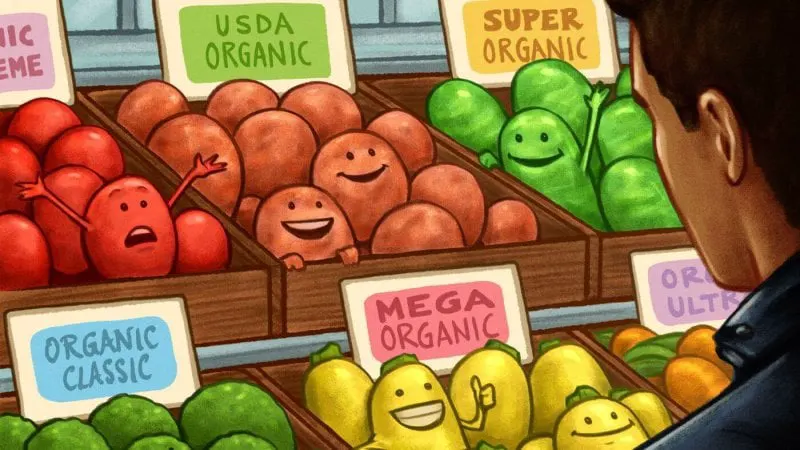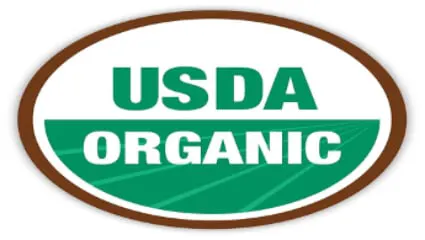Viewpoint: Most consumers are ignorant of farming—and ‘easy targets’ for peddlers of organic food misinformation
Viewpoint: Most consumers are ignorant of farming—and ‘easy targets’ for peddlers of organic food misinformation


The other 98%, including my students, you, and me, are easy targets for a wide variety of misinformation intended to exploit their misunderstandings, especially an irrational fear of chemicals, chemophobia. This unfounded consumer fear remains even though all things, including ourselves, are made entirely of chemicals.
Consider this simple illustration. Using the USDA Organic, I ask students a simple question: Based on your perception of what this label is supposed to indicate to consumers, is this organic produce inherently safer and more nutritious than conventionally grown? The overwhelming response is always yes.

However, the USDA states explicitly that the seal has nothing to do with “food safety or nutrition,” which are the main selling points of organic crops to consumers. The label simply indicates that the produce was grown adhering to specific rules and regulations and has nothing to do with any safety or nutritional benefits.
“let me make it clear about one thing. The organic label is a marketing tool. It is not a statement about food safety. Nor is ‘organic’ a value judgment about nutrition or quality.”
– Dan Glickman, Secretary US Department of Agriculture 2000
A 2014 review, entitled “Why Consumers Pay More for Organic Foods? Fear Sells and Marketers Know it”, by Academic Reviews, a global nonprofit organization of academic professors and researchers; evaluated more than 200 published academic, industry and government research reports, as well as assessing more than 1,000 news reports, 500 websites and social media accounts. They found:
“Our report finds consumers have spent hundreds of billion dollars purchasing premium-priced organic food products based on false or misleading perceptions about comparative product food safety, nutrition, and health attributes. The research found extensive evidence that widespread, collaborative, and pervasive industry marketing activities are a primary cause for these misperceptions. This suggests a widespread organic and natural products industry pattern of research-informed and intentionally-deceptive marketing and paid advocacy. Further, this deceptive marketing is enabled and conducted with the implied use and approval of the U.S. government endorsed and managed U.S. Department of Agriculture (USDA) Organic Seal, and corresponding National Organic Standards Program (NOSP) in direct conflict with the USDA’s NOSP stated intent and purpose.” [emphasis added]
In short, the organic industry knows that unless they can effectively demonize conventionally grown produce by creating a consumer misconception of superior safety and health of organics, using blatantly false and deceptive marketing methods, then the foundation of the whole organic food industry and its ability to enhance sales would be impossible. Consumers would simply be unable to justify the additional cost of the produce or products based upon the facts.
Over the next few weeks, we will consider organic vs. conventional food adapted from The Myths of Nutrition Science. We will consider five typical consumer misconceptions, which leads them to believe that they must spend roughly 40% more for their food.
- Organic foods are more nutritious, which they are not.
- Organic foods are safer, which they are not.
- Organic foods taste better, which they do not if both products are picked equally ripe.
- Organics are inherently better for the environment, which is not true.
- Is it even organic in the first place?
David Lightsey M.S., a Food and Nutrition Science Advisor with Quackwatch.org, is the author of “Muscles Speed and Lies, What the Sport Supplement Industry Does Not Want Athletes or Consumers to Know.”
A version of this article was originally posted at the American Council on Science and Health and has been reposted here with permission. The American Council on Science and Health can be found on Twitter @ACSHorg

 | Videos | More... |

Video: Nuclear energy will destroy us? Global warming is an existential threat? Chemicals are massacring bees? Donate to the Green Industrial Complex!
 | Bees & Pollinators | More... |

GLP podcast: Science journalism is a mess. Here’s how to fix it

Mosquito massacre: Can we safely tackle malaria with a CRISPR gene drive?

Are we facing an ‘Insect Apocalypse’ caused by ‘intensive, industrial’ farming and agricultural chemicals? The media say yes; Science says ‘no’
 | Infographics | More... |

Infographic: Global regulatory and health research agencies on whether glyphosate causes cancer
 | GMO FAQs | More... |

Why is there controversy over GMO foods but not GMO drugs?

How are GMOs labeled around the world?

How does genetic engineering differ from conventional breeding?
 | GLP Profiles | More... |

Alex Jones: Right-wing conspiracy theorist stokes fear of GMOs, pesticides to sell ‘health supplements’




 Trust issues: What happens when therapists use ChatGPT?
Trust issues: What happens when therapists use ChatGPT? Fighting deforestation with CO2: Biotechnology breakthrough creates sustainable palm oil alternative for cosmetics
Fighting deforestation with CO2: Biotechnology breakthrough creates sustainable palm oil alternative for cosmetics California, Washington, Oregon forge immunization alliance to safeguard vaccine access against federal undermining
California, Washington, Oregon forge immunization alliance to safeguard vaccine access against federal undermining Viewpoint — Fact checking MAHA mythmakers: How wellness influencers and RFK, Jr. undermine American science and health
Viewpoint — Fact checking MAHA mythmakers: How wellness influencers and RFK, Jr. undermine American science and health 30-year-old tomato line shows genetic resistance to devastating virus
30-year-old tomato line shows genetic resistance to devastating virus Viewpoint: Video — Big Solar is gobbling up productive agricultural land and hurting farmers yet providing little energy or sustainabilty gains
Viewpoint: Video — Big Solar is gobbling up productive agricultural land and hurting farmers yet providing little energy or sustainabilty gains The free-range chicken dilemma: Better for birds, but with substantial costs
The free-range chicken dilemma: Better for birds, but with substantial costs ‘You have to treat the brain first’: Rethinking chronic pain with Sanjay Gupta
‘You have to treat the brain first’: Rethinking chronic pain with Sanjay Gupta
